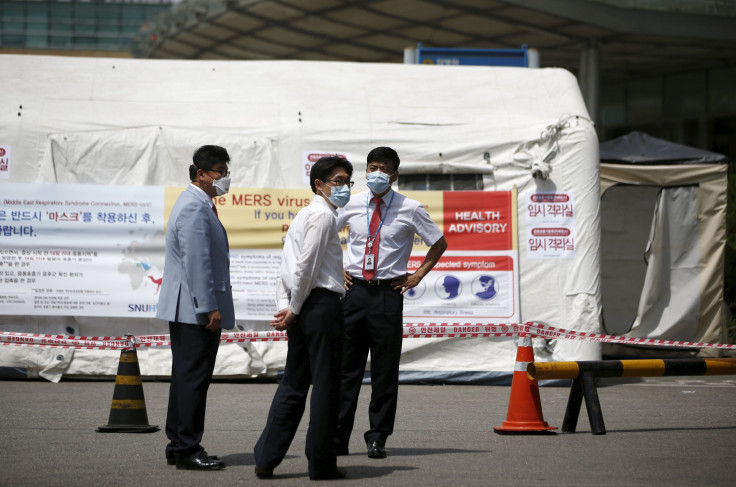MERS In South Korea: Virus Kills 4 As Country Works To Contain Outbreak

As South Korea struggles to curb the spread of the Middle East Respiratory Syndrome (MERS), a fourth person died Thursday after contracting the virus. Five more cases were also confirmed, taking the total number of people infected to 41. The country’s health ministry said that most of the patients who contracted the disease were patients at the same hospital, located south of Seoul.
The latest MERS victim in the country was a 76-year-old man who was being treated at a state-designated treatment center. He was diagnosed with the viral disease on May 21, after he came in close contact with the country's first patient, who has not yet been identified, Yonhap reported. The five new cases of the disease were found to have received a tertiary infection, heightening the threat of a larger outbreak as such people can pass the virus on to others they have been in close contact with.
MERS, which does not have a vaccine yet, has so far affected 1,142 people in 23 countries, since it was first reported in 2012. In South Korea, the disease was first reported on May 20 after a 68-year-old man was diagnosed with the disease after returning from Saudi Arabia.
One of the five people most recently diagnosed with MERS is an officer with South Korea's air force and was in the same hospital as the first MERS patient in the country. However, officials believe that he received the disease through a tertiary infection. Since the first case of a tertiary infection was discovered Tuesday, the number of people suspected to have the infection has grown to 1,600.
The number of suspected infections climbed drastically after Seoul Mayor Park Won-soon claimed that a doctor, diagnosed with the disease, had attended several meetings. The doctor has denied the allegation, stating that he attended the meetings when he was not diagnosed with the disease, and that he took the necessary precautions after he found out that he was exposed to the deadly virus.
Seoul’s Health Minister Moon Hyung Pyo, who expressed regrets over the allegations against the doctor, said Friday at a briefing, according to Bloomberg, that 30 of the 41 people diagnosed with MERS had contracted the disease at the Pyeongtaek St. Mary’s Hospital in Seoul. Choi Bo Youl, a medical professor at Seoul’s Hanyang University, warned at the briefing that the hospital did not have adequate ventilation and the hospital air-conditioning could hasten the virus' spread.
The hospital has been closed since May 29, and over 1,160 schools and colleges have also been closed temporarily even as residents have blamed the government for not doing enough to address the crisis. The health ministry also reportedly said that the country’s government and the World Health Organization will now form a joint mission team, consisting of experts in virus research and infection management, Bloomberg reported.
The virus creates flu-like symptoms including pneumonia, breathing problems and, in severe cases, kidney failure and death. The health ministry is also conducting a DNA test of the MERS coronavirus to identify any mutations that may contribute to a faster spread, Yonhap reported.
© Copyright IBTimes 2025. All rights reserved.






















